Seascape Alaska 6: Gulf of Alaska Transit Mapping
(EX2307)
Exploration Team
Naming every expedition participant in a telepresence-enabled mission is next to impossible! Many researchers from dozens of institutions across the country have provided input into the expedition plan and are expected to participate. However, we've assembled information about the members of the team who are physically onboard NOAA Ship Okeanos Explorer during the Seascape Alaska 6 expedition.
And of course, none of this exploration would be possible without the work of the dedicated NOAA Commissioned Officer Corps and civilians who operate NOAA Ship Okeanos Explorer as part of NOAA's fleet managed by NOAA's Office of Marine and Aviation Operations.

LTJG Abby Letts
Technical Operations Team Lead and Expedition Coordinator, NOAA Ocean Exploration
Lieutenant, Junior Grade (LTJG) Abby Letts is a NOAA Corps officer who is currently serving as the Technical Operations Team Lead for NOAA Ocean Exploration. In this role, she assists with shoreside coordination and field operations on NOAA Ship Okeanos Explorer. She attended Haverford College, graduating with a B.S. in geology and a B.A. in Spanish. She received an M.S. in Earth science from University of California, Santa Barbara, with a focus on paleoclimate. For her master's thesis, she analyzed trace elements and structural changes in speleothems to reconstruct the precipitation history of Central Asia. Post graduate school, she was commissioned into the NOAA Corps and sailed for two years as a deck officer aboard Okeanos Explorer before joining NOAA Ocean Exploration for her current assignment.
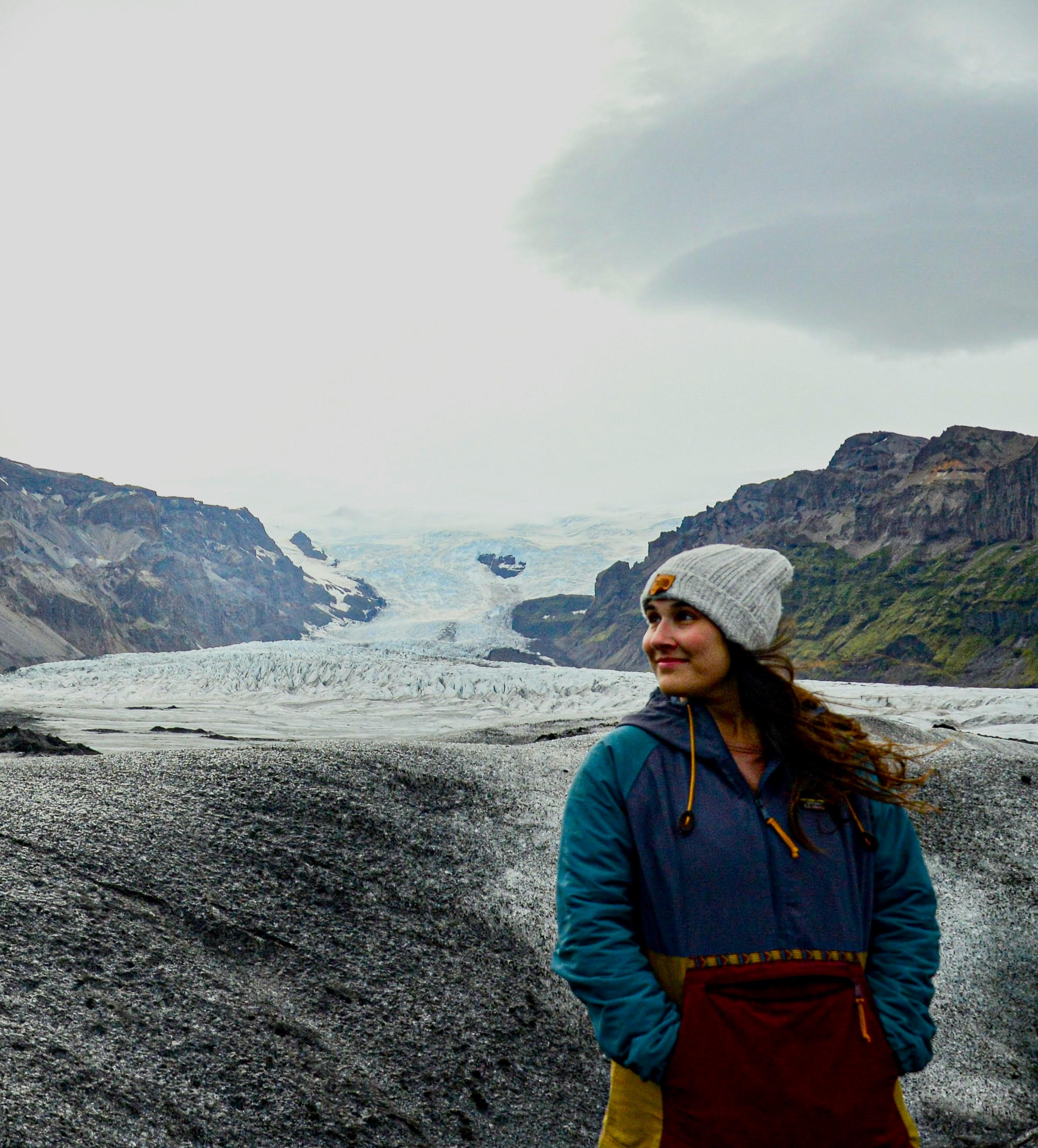
Trish Albano
Expedition Coordinator (in Training), NOAA Ocean Exploration
Trish Albano is an expedition coordinator with NOAA Ocean Exploration. Prior to taking on this role, Trish spent three years as the Internship Program Coordinator for the National Marine Sanctuary Foundation in support of NOAA Ocean Exploration, facilitating experiential learning opportunities that train the next generation of ocean explorers and developing a keen interest in deep ocean science and exploration. She holds a Master of Science in marine ecosystems and society and an undergraduate degree in marine and atmospheric science, both from the University of Miami. Before joining the NOAA Ocean Exploration team in 2020, Trish conducted research on coastal and pelagic sharks in Miami, the Bahamas, and South Africa as part of the University of Miami Shark Research and Conservation Program. Her research topics were largely ecologically focused, given her interest in the use of marine protected areas as conservation management tools. While conducting research with this group, Trish also managed the shark lab’s internship program. Trish is originally from South Florida, and now resides in Washington DC. In her free time, you can find her traveling to new places, camping, hiking, or paddling in the river with her rescue pup, Mahi.

Shannon Hoy
Expedition Coordinator Team Lead, NOAA Ocean Exploration
Shannon Hoy is the expedition coordinator team lead with NOAA Ocean Exploration. She has always had a love of the ocean and started going to sea as an undergraduate on numerous seafloor mapping missions. On two of these expeditions, she was a NOAA Ocean Exploration explorer-in-training on NOAA Ship Okeanos Explorer! Now she leads field expeditions aboard Okeanos Explorer using a variety of tools such as multibeam sonars and remotely operated vehicles to map and explore remote and/or poorly understood areas of our ocean. When not in the field, she focuses on improving NOAA Ocean Exploration's operational efficiency and effectiveness and works to improve the pace and quality of ocean mapping as an active participant in the global mapping community. Her specialty is in deepwater ocean mapping and she received a master’s degree in Earth Sciences: Ocean Mapping from the University of New Hampshire.
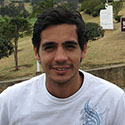
Fernando Aragon
Data Engineer, Global Foundation for Ocean Exploration
Fernando Aragon graduated from the University of Hawaii at Manoa with a bachelor’s degree in mechanical engineering. During his studies, he had experience in several fields including conceptual design, aerospace research, mechanical design, robotics and software development. From these activities he was able to intern for NASA at the Jet Propulsion Laboratory, present research at a national conference, and even co-author a technical paper in the Journal of the Astronautical Sciences. His most recent position was at the Field Robotics Laboratory (FRL), where he helped support operations, testing, and software development for two unmanned surface vehicles. From his time in FRL, he discovered a true passion for development and design of robotic systems. Originally from Colombia, Fernando enjoys outdoor activities and currently resides in State College, Pennsylvania.
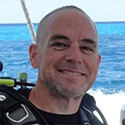
Mark Durbin
Data Engineer, Global Foundation for Ocean Exploration
Mark Durbin holds a bachelor’s degree in information technology and a master’s in computer information systems from Tarleton State University, where he focused on network security solutions. Mark has over 28 years experience in designing, testing, and supporting numerous variations of voice/data wired/wireless telecommunications networking solutions and security solutions, services, and products. During his career at MCI/Verizon, he held several engineering, research and development, and management positions and was with the company for over 23 years. During this time, he worked on key network projects and initiatives, including federal security solutions, access solutions, security services, virtualization, and many other large network solutions. In addition, he received four patents for networking and security solutions. Mark is married to Laura, his wife of 32 years, and has three kids and five grandkids. Some of Mark's hobbies and interests include car, truck, and boat repair/restoration; hiking; biking; running; camping; hunting; fishing; boating; amateur radio; storm chasing; home automation/security systems; fitness instructing; and scuba diving.
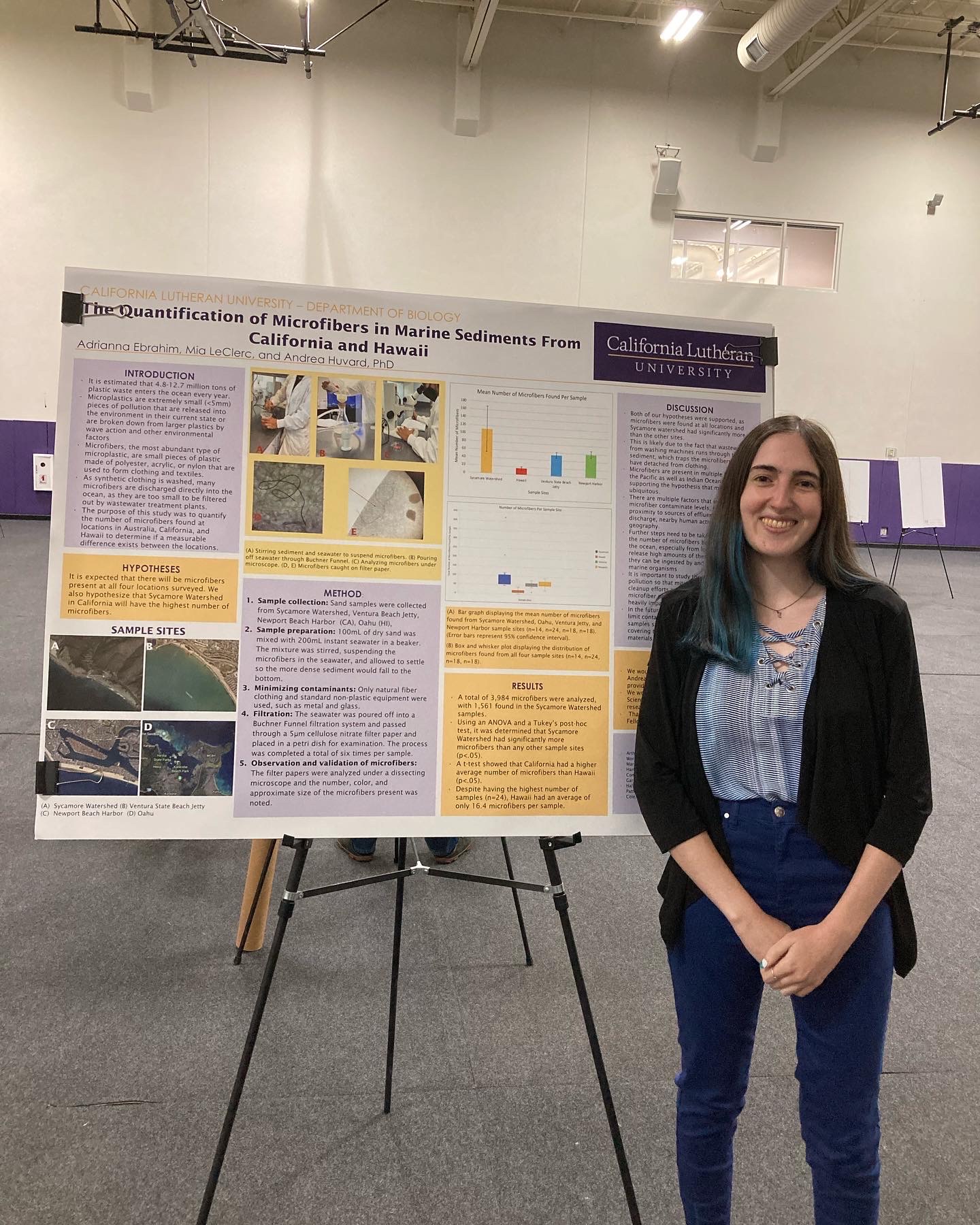
Adrianna Ebrahim
Explorer-in-Training, NOAA Ocean Exploration
Adrianna Ebrahim earned her B.S. in biology from California Lutheran University (CLU). While at CLU, she spent a year and a half taking honors research courses and developed and presented research about microfiber pollution in coastal sand sediments in Southern California. She and her research partner published this research, titled “Quantification of Microfibers from Marine Sediments from Three Locations in Southern California: An Exposed Beach (Ventura County), a Watershed (Los Angeles County), and an Enclosed Harbor (Orange County)” in the American Journal of Undergraduate Research in 2022. After graduation, she worked as a seasonal wetland technician through the San Onofre Nuclear Generating Station Mitigation Monitoring Program (SONGS MMP) at the University of California Santa Barbara. This work, along with her research, has increased her passion for the protection and exploration of coastal and marine ecosystems. When she isn’t working, Adrianna enjoys writing, going tide pooling, and taking care of her freshwater fish tank.
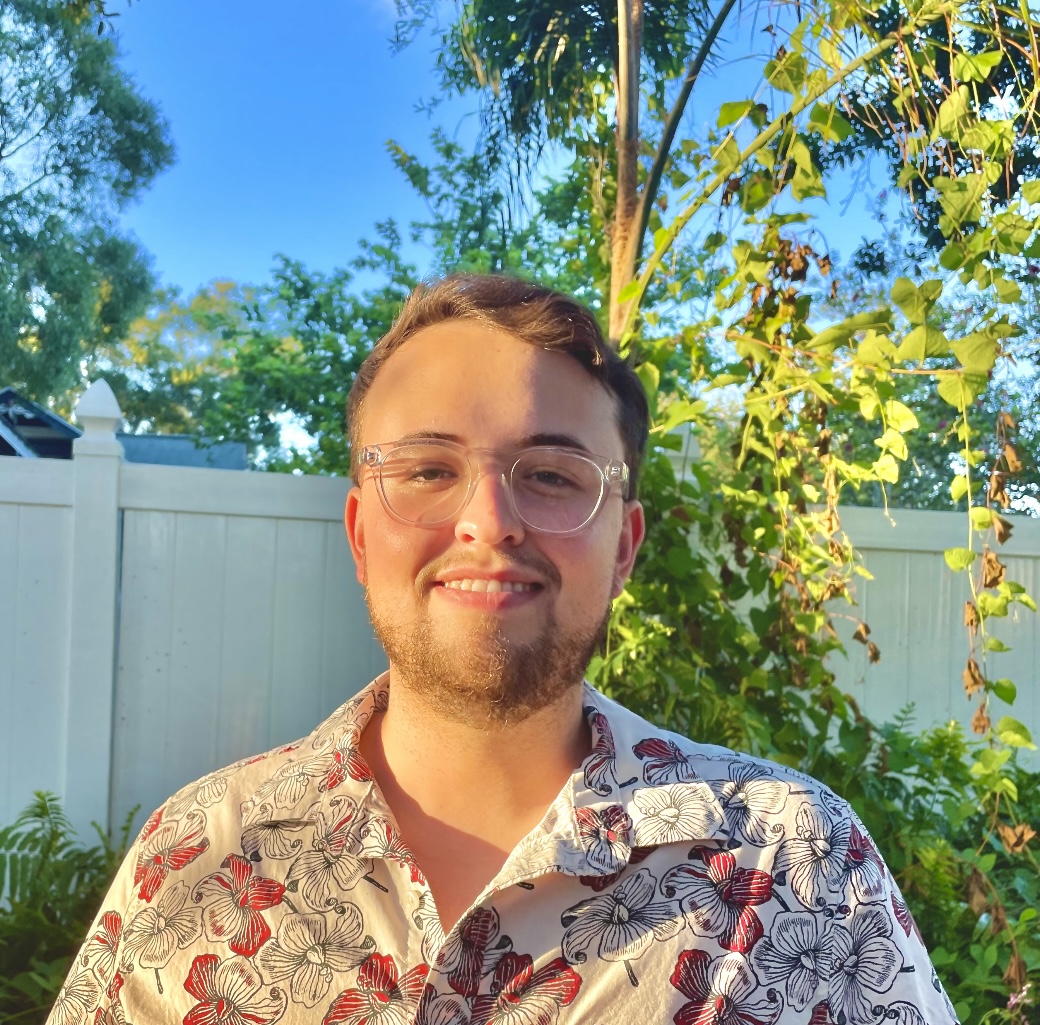
Jonathan Griffiths
Explorer-in-Training, NOAA Ocean Exploration
Jonathan Griffiths earned his bachelor’s degree in marine science with a focus on geophysics and a minor in applied mathematics from Eckerd College. During his first internship with the U.S. Geological Survey (USGS), he was able to use an Acoustic Doppler Current Profiler (ADCP) and sediment mixing tank in a lab to simulate the data that other ADCPs were gathering at degrading coral reefs off the coast of Key West, Florida. After graduation, he became a contractor for USGS and now works with a laser diffraction particle size analyzer (LS 13 320) to determine sediment deposition trends going on at Grand Bay, Mississippi. His interest in deep-ocean discovery began in college when he took a seminar studying hydrothermal vents. It was this seminar that encouraged him to want to pursue a career in hydrography and participate in the 81st multibeam sonar course. This course was hosted by the Ocean Mapping Group and provided a theoretical and practical background in marine swath survey technology and techniques for hydrographic surveys, continental shelf boundary delimitation, offshore engineering, route survey, and scientific research.
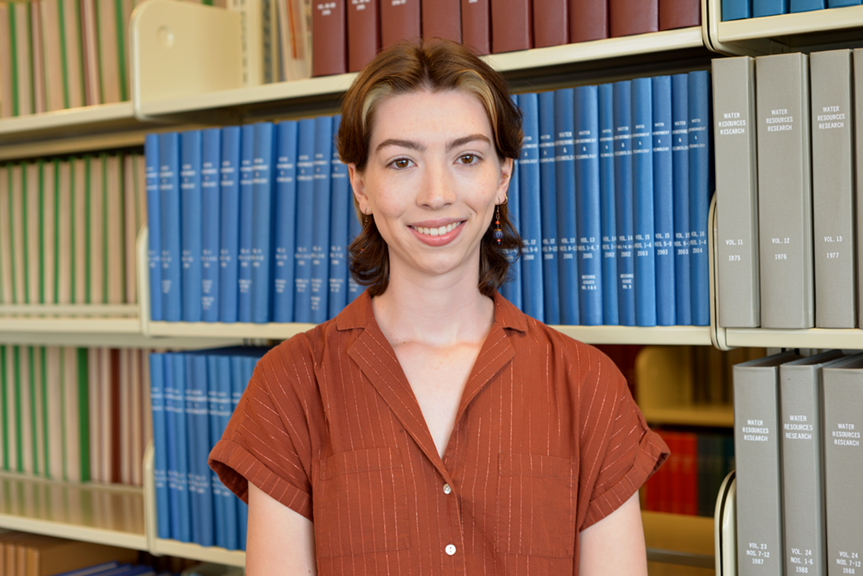
Ingrid Martinson
Explorer-in-Training, NOAA Ocean Exploration
Ingrid Martinson is a fourth-year student studying marine science at California State University, Monterey Bay. She is a NOAA EPP/MSI (Educational Partnership Program for Minority Serving Institutions) scholar and has completed two summer internships during the program. Her first internship was at Hollings Marine Laboratory in Charleston, South Carolina, where she completed a project investigating the long-term effects of oil spills on fauna in the salt marsh ecosystem. Her second internship was in Seattle, Washington, working with NOAA non-profit partner Puget Sound Restoration Fund on a bull kelp restoration project. She is continuing this project as an independent honors capstone during this school year. After graduation, Ingrid aims to pursue graduate school and build a career focused on innovative marine conservation and solutions that focus on sustainability and social justice. Ingrid is so excited to be a part of the NOAA explorer-in-training program and looks forward to learning the intricacies of seafloor mapping and what life is like aboard a research vessel!
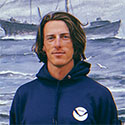
Marcel Peliks
Mapping Watch Lead, NOAA Ocean Exploration
Marcel Peliks is a passionate and dedicated professional who has focused his career on exploring and mapping the world's ocean. With a strong academic background in marine geology and oceanography, as well as technical expertise in hydrographic instrumentation, Marcel is well positioned in his role as a mapping watch lead aboard NOAA Ship Okeanos Explorer to help uncover the geological processes, biodiversity, and potential resources that lie beneath the ocean's surface. Beyond the scientific aspect, Marcel is deeply committed to the preservation and conservation of marine environments. Through his work, he aims to enhance our understanding of the ocean's role in the Earth's ecosystem, supporting ongoing efforts to protect and sustainably manage these fragile habitats, as well as inspire others to appreciate the profound beauty and importance of the underwater realm. When he is not sailing, Marcel resides in California where he likes to spend his free time on the coast or in the mountains.